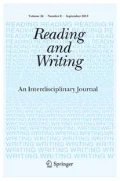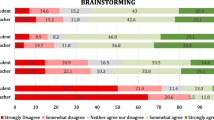Abstract
The current study explores the contributions of written vocabulary and syntax to informational writing quality in Grades 5 through 8. Various aspects of language skills (receptive to written, oral register to academic register) have differing relationships with narrative and informational writing achievement across development. In this study, we explore one relatively understudied aspect of language (written language in the oral register) during a key transition period. Specifically, we find support for the role of vocabulary and syntax skills in informational writing quality in early and later middle school; that the role may differ according to students’ skill level; and we explore the role of written vocabulary and syntax in the gender gap between girls’ and boys’ informational writing quality.

Similar content being viewed by others
References
Abbott, R. D., Berninger, V. W., & Fayol, M. (2010). Longitudinal relationships of levels of language in writing and between writing and reading in grades 1 to 7. Journal of Educational Psychology, 102, 281. https://doi.org/10.1037/a0019318.
Ahmed, Y., Francis, D. J., York, M., Fletcher, J. M., Barnes, M., & Kulesz, P. (2016). Validation of the direct and inferential mediation (DIME) model of reading comprehension in grades 7 through 12. Contemporary Educational Psychology, 44, 68–82. https://doi.org/10.1016/j.cedpsych.2016.02.002.
Arfe, B., Dockrell, J. E., & De Bernardi, B. (2016). The effect of language specific factors on early written composition: The role of spelling, oral language and text generation skills in a shallow orthography. Reading and Writing: An Interdisciplinary Journal, 29, 501–527. https://doi.org/10.1007/s11145-015-9617-5.
Beers, S. F., & Nagy, W. E. (2009). Syntactic complexity as a predictor of adolescent writing quality: Which measures? Which genre? Reading and Writing: An Interdisciplinary Journal, 22(2), 185–200. https://doi.org/10.1007/s11145-007-9107-5.
Berman, R. A. (2009). Acquisition of compound constructions. In R. Lieber & P. Stěkauer (Eds.), The Oxford handbook of compounding (pp. 298–322). Oxford: Oxford University Press.
Berman, R., & Verhoeven, L. (2002). Cross-linguistic perspectives on the development of text-production abilities: Speech and writing. Written Language & Literacy, 5, 1–43. https://doi.org/10.1075/wll.5.1.02ber.
Berninger, V. W., & Fuller, F. (1992). Gender differences in orthographic, verbal, and compositional fluency: Implications for assessing writing disabilities in primary grade children. Journal of School Psychology, 30, 363–382. https://doi.org/10.1016/0022-4405(92)90004-O.
Berninger, V. W., & Winn, W. D. (2006). Implications of advancements in brain research and technology for writing development, writing instruction, and educational evolution. In C. MacArthur, S. Graham, & J. Fitzgerald (Eds.), Handbook of Writing Research (pp. 96–114). New York: Guilford.
Camarata, S., & Woodcock, R. (2006). Sex differences in processing speed: Developmental effects in males and females. Intelligence, 34, 231–252. https://doi.org/10.1016/j.intell.2005.12.001.
Catts, H. W., Petscher, Y., Schatschneider, C., Sittner Bridges, M., & Mendoza, K. (2009). Floor effects associated with universal screening and their impact on the early identification of reading disabilities. Journal of Learning Disabilities, 42, 163–176. https://doi.org/10.1177/0022219408326219.
Cromley, J. G., & Azevedo, R. (2007). Testing and refining the direct and inferential mediation model of reading comprehension. Journal of Educational Psychology, 99, 311–325. https://doi.org/10.1037/0022-0663.99.2.311.
Datchuk, S. M., & Kubina, R. M. (2013). A review of teaching sentence-level writing skills to students with writing difficulties and learning disabilities. Remedial and Special Education, 34, 180–192. https://doi.org/10.1177/0741932512448254.
Dobbs, C. L., & Kearns, D. (2016). Using new vocabulary in writing: Exploring how word and learner characteristics relate to the likelihood that writers use newly taught vocabulary. Reading and Writing: An Interdisciplinary Journal, 29, 1817–1843. https://doi.org/10.1007/s11145-016-9654-8.
Elleman, A. M., Oslund, E. L., Griffin, N. M., & Myers, K. E. (2019). A review of middle school vocabulary interventions: Five research-based recommendations for practice. Language, Speech, and Hearing Services in Schools, 50, 477–492. https://doi.org/10.1044/2019_LSHSS-VOIA-18-0145.
Enders, C. K. (2010). Applied missing data analysis. New York: Guilford Press.
Englert, C. S., Okolo, C. M., & Mariage, T. V. (2009). Informational writing across the curriculum. In G. Troia (Ed.), Instruction and assessment for struggling writers: Evidence-based practices (pp. 132–161). New York: Guilford Press.
Figueroa, J., Meneses, A., & Chandia, E. (2018). Academic language and the quality of written arguments and explanations of Chilean 8th graders. Reading and Writing: An Interdisciplinary Journal, 31, 703–723.
Fitzgerald, J., & Shanahan, T. (2000). Reading and writing relations and their development. Educational Psychologist, 35, 39–50. https://doi.org/10.1207/S15326985EP3501_5.
Flower, L., & Hayes, J. R. (1981). A cognitive process theory of writing. In R. B. Ruddell, M. R. Ruddell, & H. Singer (Eds.), Theoretical models and processes of reading. Newark: International Reading Association.
Foorman, B. R., Koon, S., Petscher, Y., Mitchell, A., & Truckenmiller, A. (2015). Examining general and specific factors in the dimensionality of oral language and reading in 4th–10th grades. Journal of Educational Psychology, 107, 884–899. https://doi.org/10.1037/edu0000026.
Foorman, B. R., Petscher, Y., & Herrera, S. (2018). Unique and common effects of decoding and language factors in predicting reading comprehension in grades 1–10. Learning and Individual Differences, 63, 12–23. https://doi.org/10.1016/j.lindif.2018.02.011.
Furey, W. M., Marcotte, A. M., Wells, C. S., & Hintze, J. M. (2017). The effects of supplemental sentence-level instruction for fourth-grade students identified as struggling writers. Reading & Writing Quarterly, 33, 563–578. https://doi.org/10.1080/10573569.2017.1288591.
Gardner, D. (2004). Vocabulary input through extensive reading: A comparison of words found in children’s narrative and expository reading materials. Applied Linguistics, 25, 1–37. https://doi.org/10.1093/applin/25.1.1.
Goodwin, A. P., & Ahn, S. (2010). A meta-analysis of morphological interventions: Effects on literacy achievement of children with literacy difficulties. Annals of Dyslexia, 60, 183–208. https://doi.org/10.1007/s11881-010-0041-x.
Graham, S., Bañales, G., Ahumada, S., Muñoz, P., Alvarez, P., & Harris, K. R. (2020). Writing strategies interventions. In D. L. Dinsmore, L. K. Fryer, & M. M. Parinson (Eds.), Handbook of strategies and strategic processing (pp. 141–151). New York: Routledge.
Graham, S., Berninger, V., & Fan, W. (2007). The structural relationship between writing attitude and writing achievement in first and third grade students. Contemporary Educational Psychology, 32, 516–536. https://doi.org/10.1016/j.cedpsych.2007.01.002.
Graham, S., & Harris, K. (2013). Common core state standards, writing, and students with L.D: Recommendations. Learning Disabilities Research & Practice, 28, 28–37. https://doi.org/10.1111/ldrp.12004.
Graham, S., & Harris, K. R. (2020). Writing and students with learning disabilities. In A. Martin, R. Sperling, & K. Newton (Eds.), Handbook of educational psychology and students with special needs. New York: Routledge.
Graham, S., Harris, K. R., & Santangelo, T. (2015). Based writing practices and the common core: Meta-analysis and meta-synthesis. The Elementary School Journal, 115, 498–522. https://doi.org/10.1086/681964.
Graham, S., & Perin, D. (2007). A meta-analysis of writing instruction for adolescent students. Journal of Educational Psychology, 99, 445. https://doi.org/10.1037/0022-0663.99.3.445.
Hamill, D. D., & Larsen, S. C. (2009). Test of Written Language-TOWL (4th ed.). Austin: Pro-ed.
Harris, K. R., Graham, S., & Mason, L. H. (2006). Improving the writing, knowledge, and motivation of struggling young writers: Effects of self-regulated strategy development with and without peer support. American Educational Research Journal, 43, 295–340. https://doi.org/10.3102/00028312043002295.
Hua, A. N., & Keenan, J. M. (2017). Interpreting reading comprehension test results: Quantile regression shows that explanatory factors can vary with performance level. Scientific Studies of Reading, 21, 225–238. https://doi.org/10.1080/10888438.2017.1280675.
Institute for Education Sciences, Technical Working Group. (2017). Future directions for writing research at the secondary level. Washington, DC: Author. Retrieved from https://ies.ed.gov/ncer/whatsnew/techworkinggroup/.
Kim, Y. S., Al Otaiba, S., Wanzek, J., & Gatlin, B. (2015). Towards an understanding of dimensions, predictors, and the gender gap in written composition. Journal of Educational Psychology, 107, 79–95. https://doi.org/10.1037/a0037210.
Kim, Y. S. G., & Schatschneider, C. (2017). Expanding the developmental models of writing: A direct and indirect effects model of developmental writing (DIEW). Journal of Educational Psychology, 109, 35–50. https://doi.org/10.1037/edu0000129.
Knudson, R. E. (1995). Writing experiences, attitudes, and achievement of first to sixth graders. The Journal of Educational Research, 89, 90–97. https://doi.org/10.1080/00220671.1995.9941199.
Koenker, R. (2005). Quantile regression. New York: Cambridge University Press.
Koutsoftas, A., & Gray, S. (2012). Comparison of narrative and expository writing in students with and without language learning disabilities. Language, Speech, and Hearing Services in Schools, 43, 395–409. https://doi.org/10.1044/0161-1461(2012/11-0018).
Koutsoftas, A. D., & Petersen, V. (2017). Written cohesion in children with and without language learning disabilities. International Journal of Language and Communication Disorders, 52, 612–625. https://doi.org/10.1111/1460-6984.12306.
Language and Reading Research Consortium. (2015). The dimensionality of language ability in young children. Child Development, 86, 1948–1965. https://doi.org/10.1111/cdev.12450.
Lawrence, J. F., Crosson, A. C., Paré-Blagoev, E. J., & Snow, C. E. (2015). Word Generation randomized trial: Discussion mediates the impact of program treatment on academic word learning. American Educational Research Journal, 52, 750–786. https://doi.org/10.3102/0002831215579485.
Lawrence, J. F., White, C., & Snow, C. E. (2010). The words students need. Educational Leadership, 68, 23–26.
Lee, J. (2013). Can writing attitudes and learning behavior overcome gender difference in writing? Evidence from NAEP. Written Communication, 30, 164–193. https://doi.org/10.1177/0741088313480313.
Lesaux, N. K., Kieffer, M. J., Kelley, J. G., & Harris, J. R. (2014). Effects of academic vocabulary instruction for linguistically diverse adolescents: Evidence from a randomized field trial. American Educational Research Journal, 51, 1159–1194. https://doi.org/10.3102/0002831214532165.
Lonigan, C. J., & Burgess, S. R. (2017). Dimensionality of reading skills with elementary-school-age children. Scientific Studies of Reading, 21, 239–253. https://doi.org/10.1080/10888438.2017.1285918.
Maki, H. S., Voeten, M. J. M., Vauras, M. M. S., & Poskiparta, E. H. (2001). Predicting writing skill development with word recognition and preschool readiness skills. Reading and Writing: An Interdisciplinary Journal, 14, 643–672.
Meyer, B. J., & Freedle, R. O. (1984). Effects of discourse type on recall. American Educational Research Journal, 21, 121–143. https://doi.org/10.3102/00028312021001121.
Nagy, W. E., & Townsend, D. (2012). Words as tools: Learning academic vocabulary as language acquisition. Reading Research Quarterly, 47, 91–108. https://doi.org/10.1002/RRQ.011.
National Center for Education Statistics. (2012). The Nation’s Report Card: Writing 2011 (NCES 2012–470). Washington, DC: Institute of Education Sciences, U.S. Department of Education.
National Governors Association Center for Best Practices & Council of Chief State School Officers. (2010). Common core state standards: English language arts. Washington, DC: National Governors Association Center for Best Practices, Council of Chief State School Officers.
O’Rourke, L., Connelly, V., & Barnett, A. (2018). Understanding writing difficulties through a model of the cognitive processes involved in writing. In B. Miller, P. McCardle, & V. Connelly (Eds.), Writing development in struggling learners: Understanding the needs of writers across the lifecourse (pp. 12–28). Leiden: Brill.
Olinghouse, N. G., & Leaird, J. T. (2009). The relationship between measures of vocabulary and narrative writing quality in second-and fourth-grade students. Reading and Writing: An Interdisciplinary Journal, 22, 545–565. https://doi.org/10.1007/s11145-008-9124-z.
Olinghouse, N. G., & Wilson, J. (2013). The relationship between vocabulary and writing quality in three genres. Reading and Writing, 26, 45–65. https://doi.org/10.1007/s11145-012-9392-5.
Oslund, E. L., Clemens, N. H., Simmons, D. C., & Simmons, L. E. (2018). The direct and indirect effects of word reading and vocabulary on adolescents’ reading comprehension: Comparing struggling and adequate comprehenders. Reading and Writing: An Interdisciplinary Journal, 31, 355–379. https://doi.org/10.1007/s11145-017-9788-3.
Pajares, F., & Valiante, G. (1999). Grade level and gender differences in the writing self-beliefs of middle school students. Contemporary Educational Psychology, 24(4), 390–405. https://doi.org/10.1006/ceps.1998.0995.
Parr, J. M. (2010). A dual purpose database for research and diagnostic assessment of student writing. Journal of Writing Research, 2, 129–150.
Petscher, Y., Cummings, K. D., Biancarosa, G., & Fien, H. (2013). Advanced (measurement) applications of curriculum-based measurement in reading. Assessment for Effective Intervention, 38, 71–75. https://doi.org/10.1177/1534508412461434.
Petscher, Y., & Kim, Y. S. (2011). The utility and accuracy of oral reading fluency score types in predicting reading comprehension. Journal of School Psychology, 49, 107–129. https://doi.org/10.1016/j.jsp.2010.09.004.
Petscher, Y., & Logan, J. A. (2014). Quantile regression in the study of developmental sciences. Child Development, 85, 861–881. https://doi.org/10.1111/cdev.12190.
Rogers, L. A., & Graham, S. (2008). A meta-analysis of single subject design writing intervention research. Journal of Educational Psychology, 100, 879–896. https://doi.org/10.1037/0022-0663.100.4.879.
Saddler, B., & Graham, S. (2005). The effects of peer-assisted sentence-combining instruction on the writing performance of more and less skilled young writers. Journal of Educational Psychology, 97, 43–54. https://doi.org/10.1037/0022-0663.97.1.43.
Scardamalia, M., & Bereiter, M. (1987). Knowledge telling and knowledge transforming in written composition. In S. Rosenberg (Ed.), Advances in applied psycholinguistics (Vol. 2, pp. 142–175)., Reading, writing, and language learning New York: Cambridge University Press.
Scheiber, C., Reynolds, M. R., Hajovsky, D. B., & Kaufman, A. S. (2015). Gender differences in achievement in a large, nationally representative sample of children and adolescents. Psychology in the Schools, 52, 335–348. https://doi.org/10.1002/pits.21827.
Tighe, E. L., & Schatschneider, C. (2016). A quantile regression approach to understanding the relations among morphological awareness, vocabulary, and reading comprehension in adult basic education students. Journal of Learning Disabilities, 49, 424–436. https://doi.org/10.1177/0022219414556771.
Troia, G. (2014). Evidence-based practices for writing instruction (Document No. IC-5). Retrieved from University of Florida, Collaboration for Effective Educator, Development, Accountability, and Reform Center website: http://ceedar.education.ufl.edu/tools/innovation-configuration/.
Troia, G. A., Shen, M., & Brandon, D. L. (2019). Multidimensional levels of language writing measures in grades four to six. Written Communication, 36, 231–266.
Truckenmiller, A. J., McKindles, J. V., Petscher, Y., Eckert, T. L., & Tock, J. L. (2019). Expanding curriculum-based measurement in written expression for middle school. Journal of Special Education, Online first publication. https://doi.org/10.1177/0022466919887.
Truckenmiller, A. J., & Petscher, Y. (2020). The role of academic language in written composition in elementary and middle school. Reading and Writing: An Interdisciplinary Journal, 33, 45–66. https://doi.org/10.1177/0741088318819473.
Uccelli, P., Galloway, E. P., Barr, C. D., Meneses, A., & Dobbs, C. L. (2015). Beyond vocabulary: Exploring cross-disciplinary academic-language proficiency and its association with reading comprehension. Reading Research Quarterly, 50, 337–356. https://doi.org/10.1002/rrq.104.
Wagner, R. K., Puranik, C. S., Foorman, B., Foster, E., Wilson, L. G., Tschinkel, E., et al. (2010). Modeling the development of written language. Reading and Writing, 24, 203–220. https://doi.org/10.1007/s11145-010-9266-7.
Wanzek, J., Petscher, Y., Al Otaiba, S., Kent, S. C., Schatschneider, C., Haynes, M., et al. (2016). Examining the average and local effects of a standardized treatment for fourth graders with reading difficulties. Journal of Research on Educational Effectiveness, 9, 45–66. https://doi.org/10.1037/edu0000184.
Wright, T. S., & Cervetti, G. N. (2017). A systematic review of the research on vocabulary instruction that impacts text comprehension. Reading Research Quarterly, 52, 203–226. https://doi.org/10.1002/rrq.163.
Truckenmiller, A. J., Cho, E., & Troia, G. (in revision). Expanding assessment practices to instructionally relevant writing components in middle school.
Author information
Authors and Affiliations
Corresponding author
Additional information
Publisher's Note
Springer Nature remains neutral with regard to jurisdictional claims in published maps and institutional affiliations.
Measure development and data collection were supported by the Office of Research Administration in the College of Education at Michigan State University. Parts of the measure development was also supported by grant #R305A160049 from the U.S. Department of Education, Institute of Education Sciences.
Appendix
Rights and permissions
About this article
Cite this article
Truckenmiller, A., Shen, M. & Sweet, L.E. The Role of Vocabulary and Syntax in Informational Written Composition in Middle School. Read Writ 34, 911–943 (2021). https://doi.org/10.1007/s11145-020-10099-1
Accepted:
Published:
Issue Date:
DOI: https://doi.org/10.1007/s11145-020-10099-1




